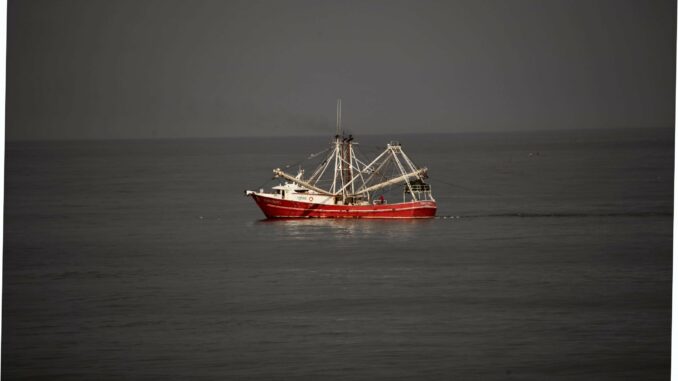
Dozens of North Carolina residents and a recreational fishing advocacy group have filed a lawsuit against state regulators over what they call “abject failure” to “properly manage” the state’s coastal resources.
The latest suit was filed on Tuesday in state court, the same day another group’s legal action against government officials’ management of marine fisheries in North Carolina was dismissed in federal court.
The Coastal Conservation Association of North Carolina, along with 86 North Carolinians, filed their civil action Tuesday against the state in Wake County Superior Court.
According to a news release, the plaintiffs include five former members of the N.C. Marine Fisheries Commission and citizens who reside in 29 counties across the state.
In an unrelated case, an organization called the North Carolina Coastal Fisheries Reform Group filed a federal lawsuit in August saying regulations that allow large, ocean-going shrimp trawlers to work in the state’s sounds violated the Clean Water Act.
The N.C. Department of Environmental Quality said Tuesday the NCCFRG voluntarily dropped their lawsuit on Friday, after a dismissal request was submitted by state attorneys in September.
“The state moved to dismiss the suit on several grounds, including that the Division of Marine Fisheries was improperly named as a defendant and that the Reform Group failed to state sufficient facts to support a claim that the Division had violated the Clean Water Act,” the department said.
“This dismissal confirms our view from the outset that the claims in this lawsuit were without legal merit, and detract from the meaningful efforts of diverse stakeholders working together to ensure we protect our resources for current and future generations,” said state Secretary of Environmental Quality Michael Regan.
Representatives of NCCFRG had not commented on the dismissal as of late Wednesday.
More from the CCA of N.C. on their lawsuit:
The suit is based on the State’s longstanding, public-trust responsibilities to manage coastal fish stocks in a way that protects the public-trust rights of the public, as incorporated in the North Carolina Constitution, to fish in North Carolina’s coastal waters. The complaint points out that coastal fisheries resources are held by the State in trust for the benefit of all current and future North Carolina citizens.
The State has failed to meet that legal duty, however, instead allowing for-profit exploitation of coastal fisheries resources by fewer than 7,000 citizens to supplant the public rights of 11 million citizens to use coastal fisheries resources. The complaint attributes the State’s policy to “regulatory capture,” where the State’s regulatory agencies ultimately become co-opted to serve the commercial interests they are charged with regulating. The complaint is clear, however, that law-abiding commercial fishing license holders are not directly responsible for the poor state of North Carolina’s coastal fish stocks. Instead, the complaint explains that the root cause of the demise of those stocks is the State’s mismanagement of its coastal fisheries resources.
The complaint sets forth in detail specific evidence of the decades-long, uninterrupted, and dramatic overall decline in coastal fish stocks in North Carolina, and the demise of several specific fish stocks historically significant to the fishing public. The complaint discusses evidence of that decline, including fish stock age truncation, overall non-viability of coastal fish stocks, declining commercial landings, and reduced public harvest limits.
The evidence of the State’s failure to meet its obligations with respect to coastal fisheries resources is overwhelming, according to the complaint: “Stocks in multiple fish species like river herring, Southern flounder, striped bass, spot, croaker and weakfish have declined precipitously since the late 1980s, with little to no will or effort by the State to implement the measures necessary to recover those stocks.”
The complaint cites three critical State management failures that have infringed on the public’s right to fish for personal use: (1) facilitating commercial fishing practices and gears that cause staggering amounts of resource wastage; (2) allowing chronic overfishing of multiple fish stocks historically important to the fishing public to cause stock demise; and (3) disregarding a lack of reporting of any harvest by over half of all State commercial fishing license holders.
On the first of these failures, the State has allowed long-term shrimp trawling in estuarine areas populated with juvenile fish and has facilitated a proliferation in the use of unattended gillnets. The complaint contends that because both practices result in enormous resource wastage, “all other southeastern states have either banned the practices or imposed management controls that severely curtail their wastage.” Citing extensive evidence, the complaint contends that the resource wastage caused by the State’s mismanagement has decimated North Carolina’s spot, weakfish (grey trout) and Atlantic croaker stocks, and contributed significantly to the overfishing of Southern flounder and striped bass.
Notably, the North Carolina Division of Marine Fisheries’ own studies indicate that hundreds of millions of juvenile spot, croaker and weakfish are killed and wasted annually by the shrimp trawl fishery alone. For every pound of shrimp harvested in North Carolina sounds, 3.3 pounds of juvenile finfish are killed and wasted. By the State’s own analysis in 2018, that ratio equated to about 100 million spot and 800 million croaker wasted in 2014, the complaint notes. This is many times the combined Atlantic shrimp trawl fishery spot and croaker bycatch for South Carolina, Georgia and Florida, by a margin of 7.5 to 1. As a result of this wastage, stocks of spot, Atlantic croaker, and gray trout have declined from 84 to 98 percent since the State’s last major fisheries management reform legislation was passed in 1997.
The complaint also cites the fact that the NC Division of Marine Fisheries obtained and holds on behalf of commercial gillnetters two Incidental Take Permits under the federal Endangered Species Act, so that gillnetting can continue in North Carolina waters despite the harm gillnets cause to fish stocks and threatened and endangered sea turtles and Atlantic sturgeon. The permits are one of many indications of regulatory capture, the suit charges.
As a second “critical management failure,” the complaint goes into an in-depth history of how State-tolerated, chronic, long-term overfishing led to the demise of river herring, draconian reductions in the Southern flounder harvest, and the near collapse of striped bass in the state’s southern rivers.
As far back as 1989, State data indicated southern flounder stocks were overfished, and that overfishing was actively occurring. After decades of inaction, draconian reductions in the harvest of Southern flounder have now become necessary to end overfishing of that stock. Even so, the suit charges, the State has acted with no sense of urgency to end overfishing and attain a sustainable harvest as required by the Fisheries Reform Act of 1997. As David Sneed, Executive Director of CCA NC notes, recent data indicate that “the drastic Southern flounder harvest reductions finally put into place in 2019 and 2020 are inadequate and are falling far short of their stated goals.”
North Carolina striped bass management also illustrates the State’s failure to address overfishing of public-trust fisheries resources, and the loss of public-trust rights resulting from that mismanagement, the suit explains. In the 1990s, the State imposed substantial harvest restrictions to turn around sagging striped bass stocks in the Albemarle Sound Management Area. The State, however, did not apply those same restrictions to the striped bass stocks in the Central and Southern Management Area, even after they worked to restore the Albemarle Sound stock. As a result, the more southern North Carolina striped bass stocks have collapsed, and the only reason that any striped bass are in southern rivers is a federal stocking program that costs taxpayers $750,000 annually.
The State’s third critical management failure pertains to the State’s approach to commercial fishing licenses. The State’s data show that over the last decade, 58 percent of North Carolina’s commercial fishing licensees annually reported no landings, for any trip, even though North Carolina law requires that all landings be reported and recorded. If those “latent licenses” are not being used for fishing, they still represent an enormous commercial harvest potential that could be brought to bear at any moment. Substantially more likely, according to evidence cited in the complaint, those licenses are fished without their landings being recorded and reported to the Division, making stocks seem more abundant than they really are.
The complaint asks the Court to declare that the State has breached its legal obligations to properly manage coastal fisheries resources, as well as a permanent injunction to stop the State from committing further breaches of these obligations. In short, the complaint seeks to hold the State accountable for failing to manage our coastal fisheries resources for the benefit of all North Carolinians.
The lead attorneys in the lawsuit are Keith Johnson and Drew Erteschik at Poyner Spruill LLP, who will work closely with Dr. Tim Nifong, CCA NC’s General Counsel.

